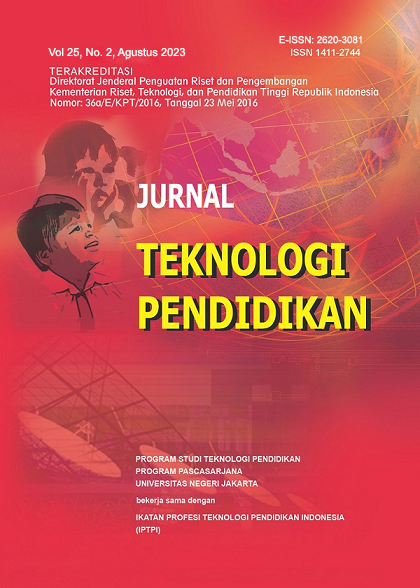An Analysis of English for Young Learner Teachers’ Classroom Management
DOI:
https://doi.org/10.21009/jtp.v25i2.35231Keywords:
classroom management performance, english for young learners teachers, eyl teachers pedgogic competenceAbstract
This current study was a case study that aimed to analyze EYL teachers' classroom management performance at Kolaka Regency, Southeast Sulawesi, Indonesia. Likewise, this study also explored the root problem behind its' limitation. As part of the methodology, five teachers were involved in the observation. All the instrument components were validated throughout the SPSS Program analysis. After the instrument was validated, the classroom interaction process was observed and recorded three times. In addition, the interview session was also gained to ensure the observation result. All the data were analyzed descriptively. The data analysis showed that the EYL teachers in Kolaka Regency had attempted effective planning, teaching technique, and student/teacher relationship simultaneously but not comprehensively. The study also found that the EYL teachers at Kolaka Regency knew the meaning of pedagogic competence as the upstream of classroom management and the effort to implement it. However, they may not be optimal due to their teaching qualities ability. Therefore, the study recommended that there must be much appreciation for EYL teachers. The study also suggested accomplishing a similar study in a larger context to support the EYL teacher's welfare policy.
References
Akreditasi, T. P. B. (2020). Borang Akreditasi USN Kolaka. Kolaka, Indonesia: Unpublished
Fachrurrazi. (2021). Urgensi Kualitas Guru. Media Indonesia, pp. https://mediaindonesia.com/opini/435578/urgensi-kualitas-guru.
Flavell, J. H. (1963). The developmental psychology of Jean Piaget.
Guerriero, S. (2014). Teachers’ pedagogical knowledge and the teaching profession. Teaching and Teacher Education, 2(1), 7.
Hattie, J. (2008). Visible learning: A synthesis of over 800 meta-analyses relating to achievement: routledge.
Huang, A. R., Revina, S., Fillaili, R., & Akhmadi. (2020). The Struggle to Recruit Good Teachers in Indonesia: Institutional and Social Dysfunctions. RESE: Research on Improving Systems of Eduction.
Kaspul, A., Faruq, U. M., & Urip, S. (2020). EXPLORING EFL TEACHERS’CLASSROOM MANAGEMENT: THE CASE OF INDONESIAN REMOTE SECONDARY SCHOOLS. Journal of Language and Education, 6(3 (23)), 22-35.
Kharisma, B., Remi, S. S., & Maharani, D. A. (2021). THE IMPACT OF INDONESIA'S SCHOOL OPERATIONAL ASSISTANCE PROGRAM ON THE TRANSITION RATE FROM PRIMARY TO JUNIOR SECONDARY SCHOOL.
Korpershoek, H., Harms, T., de Boer, H., van Kuijk, M., & Doolaard, S. (2016). A meta-analysis of the effects of classroom management strategies and classroom management programs on students’ academic, behavioral, emotional, and motivational outcomes. Review of Educational Research, 86(3), 643-680.
Lio, A. (2023). General English Lecturer Professionalism (A Case Study at USN Kolaka). KnE Social Sciences, 303–311-303–311.
Lowenberg, P. H. (1991). English as an additional language in Indonesia. World Englishes, 10(2), 127-138.
Malderez, A., & Wedell, M. (2007). Teaching teachers: Processes and practices: A&C Black.
Mitchell, B. S., Hirn, R. G., & Lewis, T. J. (2017). Enhancing effective classroom management in schools: Structures for changing teacher behavior. Teacher Education and Special Education, 40(2), 140-153.
Mudianingrum, R. A., Evenddy, S. S., & Rima, R. (2019). An analysis of teachers’ classroom management in teaching English. Journal of English Education Studies, 2(1), 1-11.
Postholm, M. B. (2013). Classroom management: What does research tell us? European Educational Research Journal, 12(3), 389-402.
Praveen, M., & Alex, A. (2017). Classroom Management: A theoretical overview. Scholarly Research Journal for Humanity Science & English Language, 6(29), 8089-8102.
Rijal, C. P. (2014). Classroom management in schools. Journal of NELTA Surkhet, 4, 48-56.
Roslina. (2023). Pengembangan Modul Mata Kuliah Dasar Umum Bahasa Inggris dalam Peningkatan profesionalisme Dosen di Universitas Sembilanbelas November Kolaka. Halu Oleo University, Kendari, Indonesia.
Roslina, R. (2021). Genetic Based EFL Classroom Management. Jurnal Teknologi Pendidikan, 23(3), 295-306.
Sabon, S. S. (2017). Kajian Kesiapan Kompetensi Guru Bahasa Inggris SMP untuk Mendukung Implementasi Kurikulum 2013 (K-13). Jurnal Penelitian Kebijakan Pendidikan, 10(2), 59-80.
Shahmohammadi, N. (2017). The Evaluation of Teachers' Job Performance Based on Total Quality Management (TQM). International Education Studies, 10(4), 58-64.
Sieberer-Nagler, K. (2016). Effective classroom-management & positive teaching. English Language Teaching, 9(1), 163-172.
Sulisworo, D., Nasir, R., & Maryani, I. (2017). Identification of teachers’ problems in Indonesia on facing global community. International Journal of Research Studies in Education, 6(2), 81-90.
Sutopo, A., Ali, R. M., Aditama, M. G., Wiguna, A., & Syafiq, A. (2020). EYL in Indonesia: Implementations, Problems, and Challenges. Paper presented at the The 5th Progressive and Fun Education International Conference (PFEIC 2020).
Downloads
Published
How to Cite
Issue
Section
License
Jurnal Teknologi Pendidikan is an Open Access Journal. The authors who publish the manuscript in Jurnal Teknologi Pendidikan agree to the following terms.
Attribution-ShareAlike 4.0 International (CC BY-SA 4.0)
-
Attribution — You must give appropriate credit, provide a link to the license, and indicate if changes were made. You may do so in any reasonable manner, but not in any way that suggests the licensor endorses you or your use.
-
ShareAlike — If you remix, transform, or build upon the material, you must distribute your contributions under the same license as the original.
- No additional restrictions — You may not apply legal terms or technological measures that legally restrict others from doing anything the license permits.
Notices:
- You do not have to comply with the license for elements of the material in the public domain or where your use is permitted by an applicable exception or limitation.
- No warranties are given. The license may not give you all of the permissions necessary for your intended use. For example, other rights such as publicity, privacy, or moral rights may limit how you use the material.








